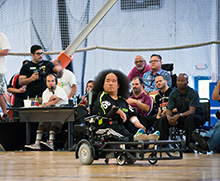Para-sports may soon have a mainstream presence
The success of events like the Paralympics is helping bring adaptive sports into the forefront of mainstream media like never before. However, the small market for these sports often leaves fans at the mercy of big broadcasters whose coverage is limited to highlights and brief segments of airtime.

That might be about to change if New Hampshire resident, Tony Jackson, has a hand in the matter. Jackson, 40, hopes to unveil a para-specific broadcasting service that will stream live events as they happen.
ParaSportsLive is scheduled to launch during the Kennebunk Savings Rugby Rampage wheelchair rugby tournament, October 21-22, and Jackson hopes that it will be the start of a new way to view para-sporting events around the globe.
Jackson is a graduate of Arizona State University’s Walter Cronkite School of Journalism and honed his broadcasting skills working for the college radio station. He went there with the hopes he’d graduate and go on to work at a radio station. However, be it his disability, (Arthrogryposis) or just a poor jobs economy, Jackson was never able to land that “dream job” in journalism and was forced to start considering other opportunities.
While the reality of an uncertain future still loomed, Jackson landed a job at the Virginia G. Piper Sports and Fitness Center (now Ability360) in Phoenix, Ariz. His misfortune in broadcast journalism was about to blossom into opportunity.
Fresh Start
While broadcasting continued to be his main focus, Jackson’s new career allowed him to go deeper into adaptive sports. He was already well known in the power soccer community, having been playing on a local team for two-years, and because of his job at Ability360, he was being introduced to other adaptive sports such as quad rugby, wheelchair basketball and adaptive swimming.
Opportunity continued for Jackson, and he soon traded the warmth of the desert for the cold, and challenging weather of Minnesota to work for Power Soccer Shop. There he would hone his play-by-play skills as a broadcaster.
“They took care of most everything, including paid international travel,” says Jackson. “How could I say no? While I was there, I traveled to Europe and South America to broadcast tournaments … you know, kind of a cool thing I would do every summer. It was fun.”
Creating Opportunity
Jackson soon relocated to New Hampshire, continuing his broadcasting work with Power Soccer Shop, but the idea of starting something of his own was quickly calling to him.
“I considered spinning off on my own, but it was still just kind of an idea at that point,” says Jackson. “After I left Minnesota, the idea was always in the back of my head. I had been talking to a friend who just encouraged me to do it, so I woke up one morning and registered a domain and kind of been working on it ever since.”
Jackson never learned why he wasn’t hired as a broadcaster, but it didn’t stop him from creating the opportunity for himself.
“It’s one of the reasons I started ParaSportsLive,” says Jackson. “Not only to get other adaptive sports out there but also to create other opportunities for people like me. I want to provide those chances for other disabled people in journalism who sought out jobs but never got that phone call.”
Jackson is hoping to grow ParaSportsLive to the point he’ll have to hire more people. Journalists and writers. Photographers and videographers. Journalists with disabilities who had a dream and desire to share other people’s stories with the world, but simply needed that break.
“I have been broadcasting power wheelchair soccer since 2013,” says Jackson. “We often get comments about how much people love having the opportunity to watch family members and friends competing. In some cases, it’s the first time they have ever seen their loved ones compete. I wanted to take that and bring it to other sports.”
While improving, mainstream media often lacks the athlete focus, leaning towards the disability and playing on the sympathy of their market. ParaSportsLive hopes to challenge that stereotype and break the barriers that typically distinguish “athlete” from “disabled athlete.”
“Too often, our disabilities are the focus when people talk about adaptive sports,” says Jackson. “That diminishes the training, dedication and sacrifice many athletes make to excel at their chosen sport. With ParaSportsLive, I want people to understand that adaptive sports athletes are exactly that…athletes. I want to give adaptive sports athletes the exposure they deserve and “normalize” disability, so that it no longer becomes the focus, but perhaps a small side story.”
Jackson’s goal is not to compete with mainstream broadcasters such as ESPN, but rather act as an outlet to bring more awareness to the para-sport community growing the demand for adaptive sports large enough that they may want to compete with him.
“I want to bring high production value and quality coverage to whatever event we cover,” says Jackson. “Making the presentation of these events look like a big deal, makes the event look like a big deal, even if it’s a small, local or regional competition. I want ParaSportsLive to be where adaptive sports competitions are happening and I want people to come to ParaSportsLive to see these competitions happening.”
Potential journalists or venues interested in learning more are encouraged to contact Jackson. Everyone else, get ready for ParaSportsLive.
Be sure to tune in October 21-22 on ParaSportsLive